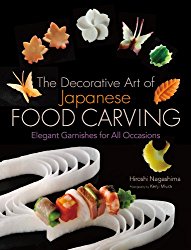
Japanese cuisine is renowned for the beauty of its presentation. Among the key elements in this presentation style are mukimono--the decorative garnishes and carvings that add the final flourish to a dish. It might be a carrot round in the shape of a plum blossom. Or a scattering of cherry blossoms plucked from a radish. Perhaps a swallow, a butterfly, a ginkgo leaf or a cluster of pine needles. Whatever the motif, it will have been created to delight the eye and the palate with its shape, color, and taste. In The Decorative Art of Japanese Food Carving, internationally acclaimed chef Hiroshi Nagashima offers 60 edible garnishes and food carvings for home, party or professional use. Some are designed to be set on top of the food. Others are fashioned to hold the food--and sometimes, they simply are the food. Each is introduced in full color, with easy-to-follow, step-by-step instructions, sample food arrangements, further ideas and secret, insider tips for successful presentation. Most are simple enough for the amateur chef to master, although a few are quite challenging and require much practice. Nagashima's instructions rely on household utensils found in a typical American kitchen--from knives to peelers to cookie cutters--and use familiar, easily attainable ingredients. The Decorative Art of Japanese Food Carving is more than a practical handbook, however. It is also an inspiration book, filled with creative suggestions and inventive ideas to enhance and transform the way we cook.